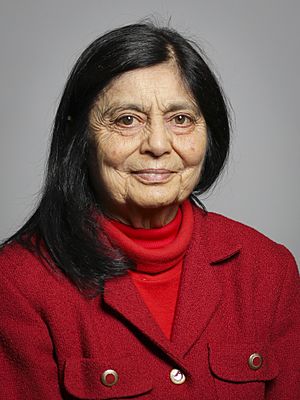Haleh Afshar, Baroness Afshar facts for kids
Quick facts for kids
The Baroness Afshar
OBE FAcSS
|
|
|---|---|

Official portrait, 2019
|
|
| Member of the House of Lords Lord Temporal |
|
| In office 13 December 2007 – 12 May 2022 Life peerage |
|
| Personal details | |
| Born |
Haleh Afshar
21 May 1944 Tehran, Imperial State of Iran |
| Died | 12 May 2022 (aged 77) Heslington, England |
| Nationality | British |
| Spouse |
Maurice Dodson
(m. 1974) |
| Alma mater | |
Haleh Afshar, Baroness Afshar (born May 21, 1944 – died May 12, 2022) was an important British woman who became a member of the House of Lords. This is a special part of the UK Parliament. She was very interested in women's rights and Islamic law throughout her life. She was also a professor at the University of York and wrote many academic books.
Contents
Haleh Afshar's Early Life and Education
Haleh Afshar was born in Tehran, Iran, on May 21, 1944. She was the oldest of four children. Her father was a law professor and even a government minister. Her mother worked hard to help women get the right to vote, which was a big achievement!
Haleh went to school in Tehran until she was 14. Then, she moved to England to attend a boarding school in Solihull. After finishing her A-levels in Brighton, she went to the new University of York. She earned her first degree in Social Sciences in 1967. Later, she studied in France and completed her doctorate degree at the University of Cambridge in 1974.
Working in Iran and Becoming a Journalist
After her studies, Haleh returned to Iran. She worked in the government's land reform ministry. She also became a journalist. Through her work, she realized that many Iranian women did not know their rights under Islamic law. An article she wrote about the Royal family was not liked, which led her to leave Iran and live in exile. In 1976, she began teaching at the University of Bradford in England.
Becoming a Professor and Public Servant
Haleh Afshar became a professor of politics and women's studies at the University of York. She also taught Islamic law as a visiting professor in France.
She was involved in many important groups. She was a founding member of the Muslim Women's Network, which helps Muslim women. She also served on committees for the British Council and the United Nations Association. These roles showed her dedication to public service and equal opportunities.
Recognized for Her Work
In 2005, Haleh Afshar received a special award called an Officer of the Order of the British Empire (OBE). This award was given for her work in promoting equal opportunities.
In 2007, she was given the title of Baroness. This meant she became a life peer in the House of Lords, which is part of the UK Parliament. She was known as Baroness Afshar of Heslington. As a "cross-bench" peer, she didn't belong to any specific political party.
In 2009, Haleh was named one of the twenty most successful Muslim women in the UK. This was part of the Muslim Women Power List, which celebrated the achievements of Muslim women. She also became an academician of the Academy of Social Sciences, which is a high honor for academics.
Haleh Afshar passed away at her home in Heslington on May 12, 2022, at the age of 77.
Honors and Achievements
Haleh Afshar received several honorary doctorates from universities. These special degrees recognized her important contributions to education and society.
- In 2011, she received an honorary doctorate from the University of Essex.
- In 2013, she was nominated for an award at the British Muslim Awards for her work in education.
- In 2017, she received another honorary doctorate from the University of Bradford.
Her Writings
Haleh Afshar wrote many books and articles about Iran and its politics, especially focusing on women's issues. Some of her well-known books include Islam and Feminisms: An Iranian Case Study and Islam and the Post Revolutionary State in Iran. She also edited many books about women and development around the world. Her writings helped people understand the challenges and strengths of women in different societies.
Images for kids
 | Misty Copeland |
 | Raven Wilkinson |
 | Debra Austin |
 | Aesha Ash |


